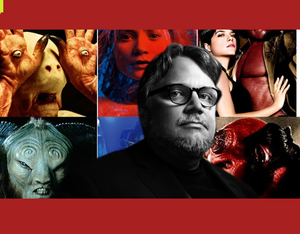
This course explores the transnational cinema of Mexican director Guillermo del Toro as a complete oeuvre with a particular aesthetic, technical and ideological project. It is a comprehensive study of a prominent filmmaker with a distinctly recognizable style that has captivated global audiences.
SPAN 535: Cabinet of Curiosities: Theorizing the Spectacular Cinema of Guillermo del Toro
Spring 2021. CRN: 39272
Wednesdays 3:30-5:50
Synchronous Via Zoom
Prof. Eduardo Ledesma
Taught in English. Essays can be written in English or Spanish.
Credit counts for the Unit’s Certificate in Criticism and Interpretive Theory
Credit also counts toward the Graduate Minor in Cinema Studies
Course Description:
This course explores the transnational cinema of Mexican director Guillermo del Toro as a complete oeuvre with a particular aesthetic, technical and ideological project. It is a comprehensive study of a prominent filmmaker with a distinctly recognizable style that has captivated global audiences. Del Toro’s production has been described as a kind of filmic “alchemy” that deftly combines elements from horror, gothic, fantasy, sci-fi, b-movies, noir, Japanese animation, comic books and other “lesser” cultural genres into eminently hybrid works of art – assembling a filmic cabinet of curiosities. Roughly divided into Spanish and English language works, del Toro’s films will be chronologically studied in their geographic and cultural specificity (at once Mexican, Spanish, Latin American, and Transnational) and from a variety of film theoretical perspectives, centered on, but not limited to auteur theory. In that sense the course will also serve as an introductory study of film theory, offering a foundation in classical film theory through the pairing of each of del Toro’s films with seminal criticism analyzing film form and ideology. Theoretical approaches will include early film theory (Munsterberg, Balazs), montage theory (Eisenstein, Pudovkin), realism (Kracauer, Bazin, Benjamin), auteur theory (Wollen, Sarris), structuralism (Metz, Heath), apparatus and psychoanalytic theory (Baudry, Metz), feminist theory (Mulvey, Modlesky), critical race theory (Dyer, Diawara), audience studies (Reinhard and Olson), decoloniality (Mignolo and Vasquez), and phenomenological film theory (Sobchack, Marks), among other approaches. The course will study all 10 major films by del Toro [Cronos (1993), Mimic (1997), The Devil’s Backbone (2001), Blade II (2002), HellBoy (2004), Pan’s Labyrinth (2006), HellBoy II: The Golden Army (2008), Pacific Rim (2013), Crimson Peak (2015) and The Shape of Water (2017)], as well as some of his television work Trollhunters (2016), The Strain (2014-).